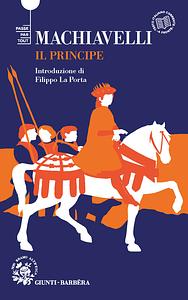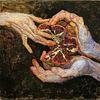Take a photo of a barcode or cover
challenging
dark
informative
medium-paced
Not sure what I really expected from this one going in. I really did found it very interesting as a part of the history of philosophical and political thought though. It was shorter and also more readable than I expected, but also very much steeped in the politics of its historical context (i.e. 16th century Italy). It's structured as a instruction manual for young leaders (a 'mirror for princes' textbook style, however written in vernacular Italian rather than Latin - something which may have made it more accessible to a wider audience that it's purported one).
As a work of ethical philosophy, I think it would be unfair to portray Machiavelli simply as an advocate for cruelty and selfishness. The treatise - written after Machiavelli's arrest, torture, and banishment by the in-coming Medici regime - describes an amoral approach to politics, taking a sort of proto-utilitarian view that leaders should be careful to develop and display moral and 'virtuous' traits when beneficial, but also not hesitate to use violence, fear, and tyranny as useful tools of control. In a break from medieval and classical scholasticism, Machiavelli seems focused not on good but on necessity. He was prepared to advocate for ambition, reform and radical innovation in favour of tradition. He seems also to be influenced by the political philosophy of Xenophon and his idealisation of strong leadership and control. Machiavelli seems pretty self-aware of the morally reprehensible nature of his arguments (seems to even find it funny at times).
In my own (uneducated) opinion, The Prince reads like it was written by someone who has witnessed a lot of human cruelty, instability, and chaos and who has given up on an ideal of human goodness surmounting evil on it's own merits, and who instead sees both virtue and vice as tools to be wielded by any ruler strong and intelligent enough to seize, hold, and maintain power.
As a work of ethical philosophy, I think it would be unfair to portray Machiavelli simply as an advocate for cruelty and selfishness. The treatise - written after Machiavelli's arrest, torture, and banishment by the in-coming Medici regime - describes an amoral approach to politics, taking a sort of proto-utilitarian view that leaders should be careful to develop and display moral and 'virtuous' traits when beneficial, but also not hesitate to use violence, fear, and tyranny as useful tools of control. In a break from medieval and classical scholasticism, Machiavelli seems focused not on good but on necessity. He was prepared to advocate for ambition, reform and radical innovation in favour of tradition. He seems also to be influenced by the political philosophy of Xenophon and his idealisation of strong leadership and control. Machiavelli seems pretty self-aware of the morally reprehensible nature of his arguments (seems to even find it funny at times).
In my own (uneducated) opinion, The Prince reads like it was written by someone who has witnessed a lot of human cruelty, instability, and chaos and who has given up on an ideal of human goodness surmounting evil on it's own merits, and who instead sees both virtue and vice as tools to be wielded by any ruler strong and intelligent enough to seize, hold, and maintain power.
Beautifully written: straight-forward, yet elegant. Much admiration for this man as a scholar and writer. The story of this book is rather ironic; it is dedicated to a Medici, who likely never read it, and Machiavelli's goal of securing an advising position was never fulfilled. However, many still read this book today.
Where I stop, however, is his content. This guy is strange. Ok, he's not that strange, but his morals are. “If an injury has to be done to a man it should be so severe that his vengeance need not be feared.”― Niccolo Machiavelli, The Prince
He talks incessantly of the path to power, of the importance of who or what has lifted one to a place of authority. Many times, he reiterates his sentiments on this subject: that a new ruler must fear those who lifted him to power, since they view themselves as equals, and possess a severe threat.
In an age of monarchy and absolutism, I suppose I understand Machiavelli's lack of moral consideration. However, I refuse to understand the sentiment that any ruler should seek to breed fear or terror within the people, to destruct their sense of independence or ability to rebel. The key difference here is my objection to the interference of the state in more of life than absolutely need be, and Machiavelli's encouragement of the state's invasion on as much of life as will make it more secure.
Me: I just don't get who reads that and is like, "I WANNA DO THAT. I WANNA BE FEARED."
Jessica: You make one wrong step and the people behead you. So gotta make sure there’s no chance of that.
Me: Yeah I know but I'd be like I’m outta here #katevibes
Jessica: Yeah hmm. I guess a lot of kings were like "hmm, sounds good to me, let’s do it"
Me: Yeah, I don't know. I mean, they were raised that way so... but I’d rather be beheaded than behead people soooo
Jessica: Well maybe that’s why you aren’t an absolute monarch in the 1700s
Anyway, long story short, I don't get this guy. He talks about his unfortunate and unjust situation of poverty early on in the book, before demonstrating his strong moral relativism and making me wonder why he ever used the word just. Then, he proceeds to advocate control and almost an early version of communism (credits to Jessica, I don't intellectually plagiarize)?
Anyway, this guy seems brilliant, and he writes extremely well, but his ideas are a little wack. The fact that he wrote this book for a purpose that was never fulfilled, yet it's widely read today, is very comical to me.
Five stars because it's definitely worth the read, not because I agree in any way, shape or form.
Oh yeah, now I can use the word "Machiavellian" and know what it means :))
Where I stop, however, is his content. This guy is strange. Ok, he's not that strange, but his morals are. “If an injury has to be done to a man it should be so severe that his vengeance need not be feared.”― Niccolo Machiavelli, The Prince
He talks incessantly of the path to power, of the importance of who or what has lifted one to a place of authority. Many times, he reiterates his sentiments on this subject: that a new ruler must fear those who lifted him to power, since they view themselves as equals, and possess a severe threat.
In an age of monarchy and absolutism, I suppose I understand Machiavelli's lack of moral consideration. However, I refuse to understand the sentiment that any ruler should seek to breed fear or terror within the people, to destruct their sense of independence or ability to rebel. The key difference here is my objection to the interference of the state in more of life than absolutely need be, and Machiavelli's encouragement of the state's invasion on as much of life as will make it more secure.
Me: I just don't get who reads that and is like, "I WANNA DO THAT. I WANNA BE FEARED."
Jessica: You make one wrong step and the people behead you. So gotta make sure there’s no chance of that.
Me: Yeah I know but I'd be like I’m outta here #katevibes
Jessica: Yeah hmm. I guess a lot of kings were like "hmm, sounds good to me, let’s do it"
Me: Yeah, I don't know. I mean, they were raised that way so... but I’d rather be beheaded than behead people soooo
Jessica: Well maybe that’s why you aren’t an absolute monarch in the 1700s
Anyway, long story short, I don't get this guy. He talks about his unfortunate and unjust situation of poverty early on in the book, before demonstrating his strong moral relativism and making me wonder why he ever used the word just. Then, he proceeds to advocate control and almost an early version of communism (credits to Jessica, I don't intellectually plagiarize)?
Anyway, this guy seems brilliant, and he writes extremely well, but his ideas are a little wack. The fact that he wrote this book for a purpose that was never fulfilled, yet it's widely read today, is very comical to me.
Five stars because it's definitely worth the read, not because I agree in any way, shape or form.
Oh yeah, now I can use the word "Machiavellian" and know what it means :))
challenging
informative
medium-paced
reflective
jag trodde aldrig jag skulle bli totalt UPPSLUKAD av en jävla faktabank från 1532 om how to take a country and stay in control. tror dock jag hade velat läsa om enbart för att förstår alla referenser om hur alla länder runt omkring under denna tidpunkten spelade roll i machiavellis perspektiv. men WOW vilka ord.
jag känner mig som genghis khan.
jag känner mig som genghis khan.
It only gets three stars because it was a school assigned reading, and i've read better books that were school assigned.
challenging
informative
slow-paced
challenging
informative
inspiring
reflective
slow-paced
Machiavelli, the man that you are
Look I don’t advocate state brutality but Machiavelli is cool as hell
I read this for class, but with my teacher's help, I was able to understand what Machiavelli was saying and the underlying message of the book.
Once I got used to the language, it was really interesting and his way of thinking about things made sense and was exciting to think about. Overall, a really good statement I think.
Once I got used to the language, it was really interesting and his way of thinking about things made sense and was exciting to think about. Overall, a really good statement I think.






